Traded Exchange Funds
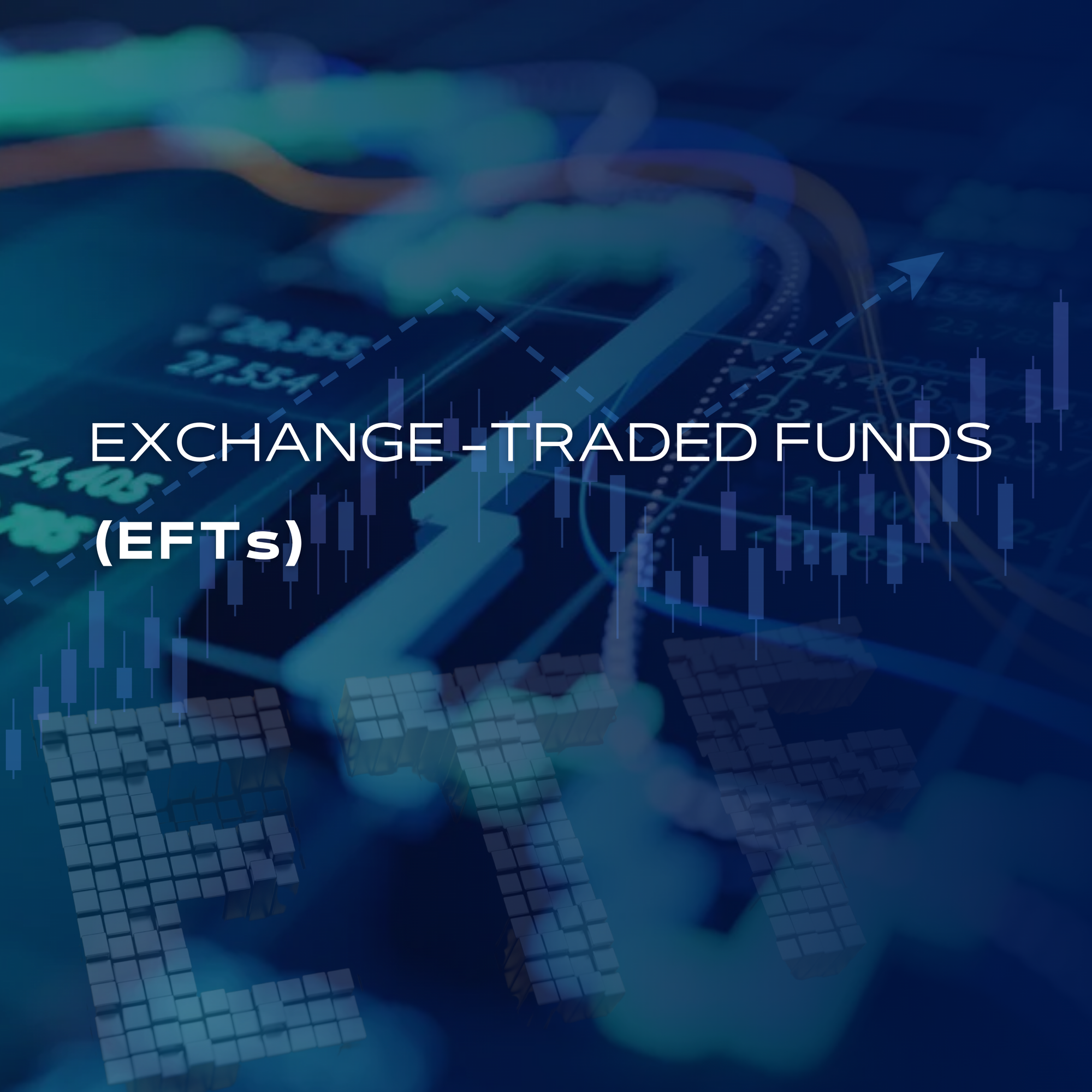
What is (ETFs) and how they are traded:
An Exchange-Traded Funds (ETFs) is a type of investment fund and exchange-traded product with shares that represent ownership in underlying assets, such as stocks, bonds, commodities, or a basket of assets. ETFs are designed to combine the features of both individual stocks and traditional mutual funds, offering several benefits to investors.
Differences between ETFs and funds available in the Saudi market:
Exchange-traded funds (ETFs) have some key differences when compared to other types of investment funds available in the Saudi Arabian market, such as mutual funds and closed-end funds. Here are the main distinctions:
1- Structure:
ETFs: structured as open-end investment companies but traded on stock exchanges, Investors can buy and sell ETF shares throughout the trading day at market price.
Mutual Funds: Mutual funds are also open-end investment companies but are not traded on an exchange. Investors can only buy and sell mutual fund shares at the fund's net asset value (NAV).
Closed-End Funds: Closed-end funds are also traded on stock exchanges, but they have a fixed number of shares. Unlike ETFs, the number of shares in a closed-end fund does not change, and their prices can differ from the fund's net asset value.
2- Liquidity:
ETFs: offer high liquidity. This can be advantageous for investors looking for intraday trading opportunities.
Mutual Funds: are less liquid since they are transacted at the end-of-day NAV. This makes them better suited for long-term investors.
Closed-End Funds: may trade at a premium or discount to their NAV, which can impact liquidity. Trading volumes can be lower compared to ETFs.
3- Pricing:
ETFs: priced continuously throughout the trading day based on market supply and demand.
Mutual Funds: transactions are executed at the NAV, which is calculated once a day after the market closes.
Closed-End Funds: prices are determined by supply and demand, which can result in prices that deviate significantly from their NAV.
4- Management Style:
ETFs: Many of them passively track an index, which means they aim to track the performance of a specific benchmark. Some ETFs are actively managed.
Mutual Funds: either actively or passively managed.
Closed-End Funds: can be actively or passively managed, like mutual funds.
5- Expense Ratios:
ETFs: have lower expense ratios compared to mutual funds, Low expenses can lead to higher net returns.
Mutual Funds: may have higher expense ratios.
Closed-End Funds: Expense ratios for closed-end funds can vary, but they are often in between ETFs and mutual funds.
Unit pricing in ETFs:
The price of the fund's units is determined by the supply and demand in the market and the unit price is the fund's net assets divided by the number of units.
Advantages and risks of ETFs:
ETFs offer many advantages, but risks should also be considered:
Advantages:
• Transparency of performance: the ability to know the net asset value daily.
• Low investment costs: Management fees are low because funds use an inactive investment method, i.e., the fund follows the performance of a certain indicative index.
• Availability of a market maker: he works to provide sales offers and purchase orders, which provides high liquidity.
Risks:
• Price fluctuation risk: Price fluctuations may lead to losses for the investor.
• Deviation of the Fund's performance from the indicative index: The performance may deviate and thus achieve a different return from the return achieved in the indicative index.
Exchange Traded Funds (ETFs) listed on Saudi Arabia Exchange (Tadawul):
1.YAQEEN 30 - YAQEEN Saudi Equity ETF (9400):
Unit price: 47.80 SAR (24 Oct 2023)
An open-ended equity fund that was listed in 2010, invests at least 95% of its assets in stocks that follow Yaqeen 30 Saudi Share Index portfolio elements (benchmark index) which includes 30 stocks of the large companies that comply with Sharia regulations in the Saudi Market (Tadawul).
The fund follows a passive management strategy by investing in the components of the benchmark Index portfolio with the same weightings and asset allocation to replicate the performance of the index. YAQEEN 30 aims to achieve long-term capital appreciation and growth, the dividends received are retained to be reinvested in the fund by purchasing in the portfolio shares. The fund management fees are 0.50% of the net asset value per annum.
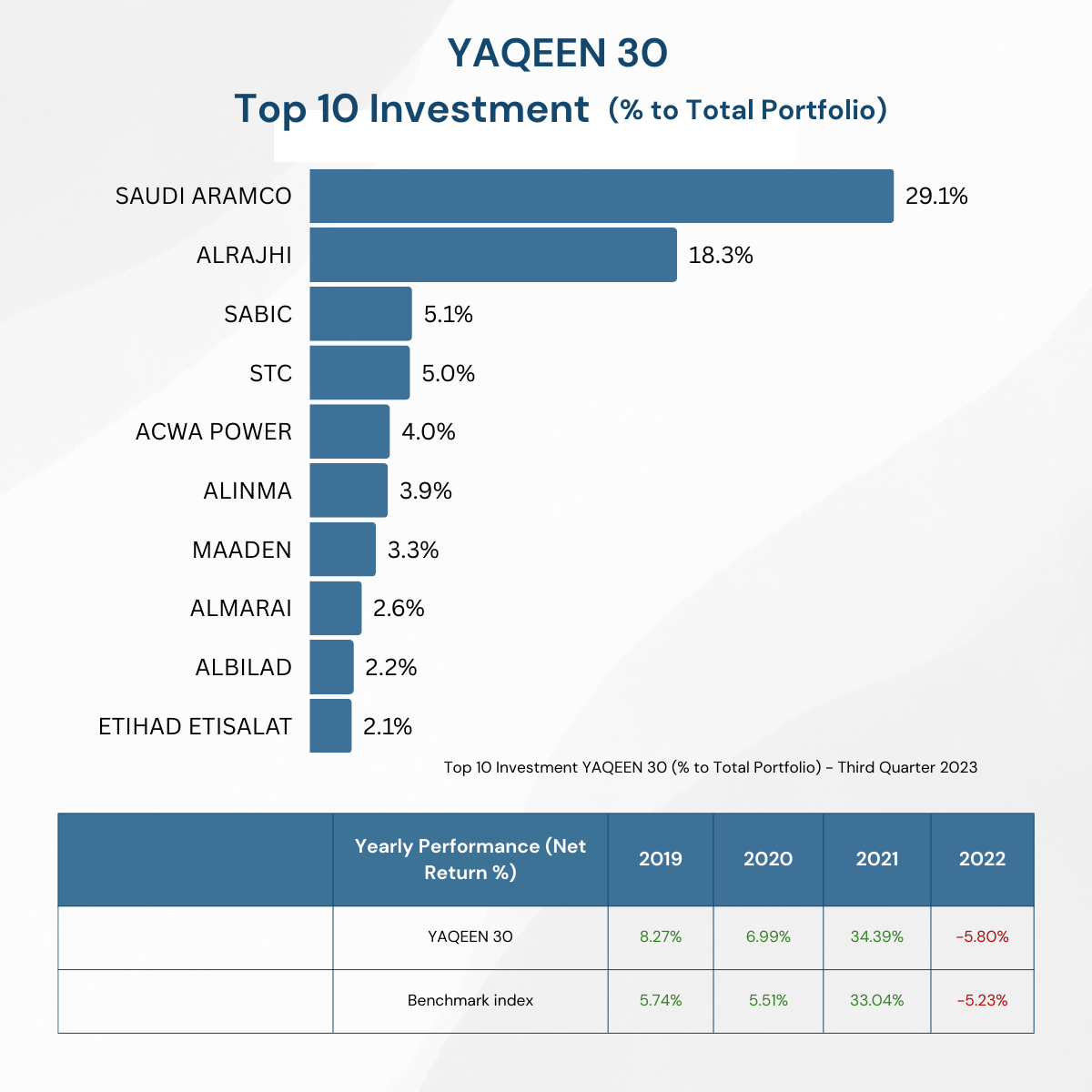
2. YAQEEN PETROCHEMICAL - YAQEEN PETROCHEMICAL ETF (9401):
Unit price: 32.05 SAR (24 Oct 2023)
An open-ended equity fund that was listed in 2010, invests at least 95% of its assets in stocks that follow Falcom Saudi Petrochemical Index (FSPI) portfolio elements (benchmark index) which includes petrochemical companies that comply with Sharia regulations in the Saudi Market (Tadawul).
The fund follows a passive management strategy by investing in the components of the benchmark Index portfolio to replicate the performance of the index. YAQEEN PETROCHEMICAL aims to achieve long term capital appreciation and growth, the dividends received are retained to be reinvested in the fund by purchasing in the portfolio shares. The fund management fees are 0.50% of the net asset value per annum.
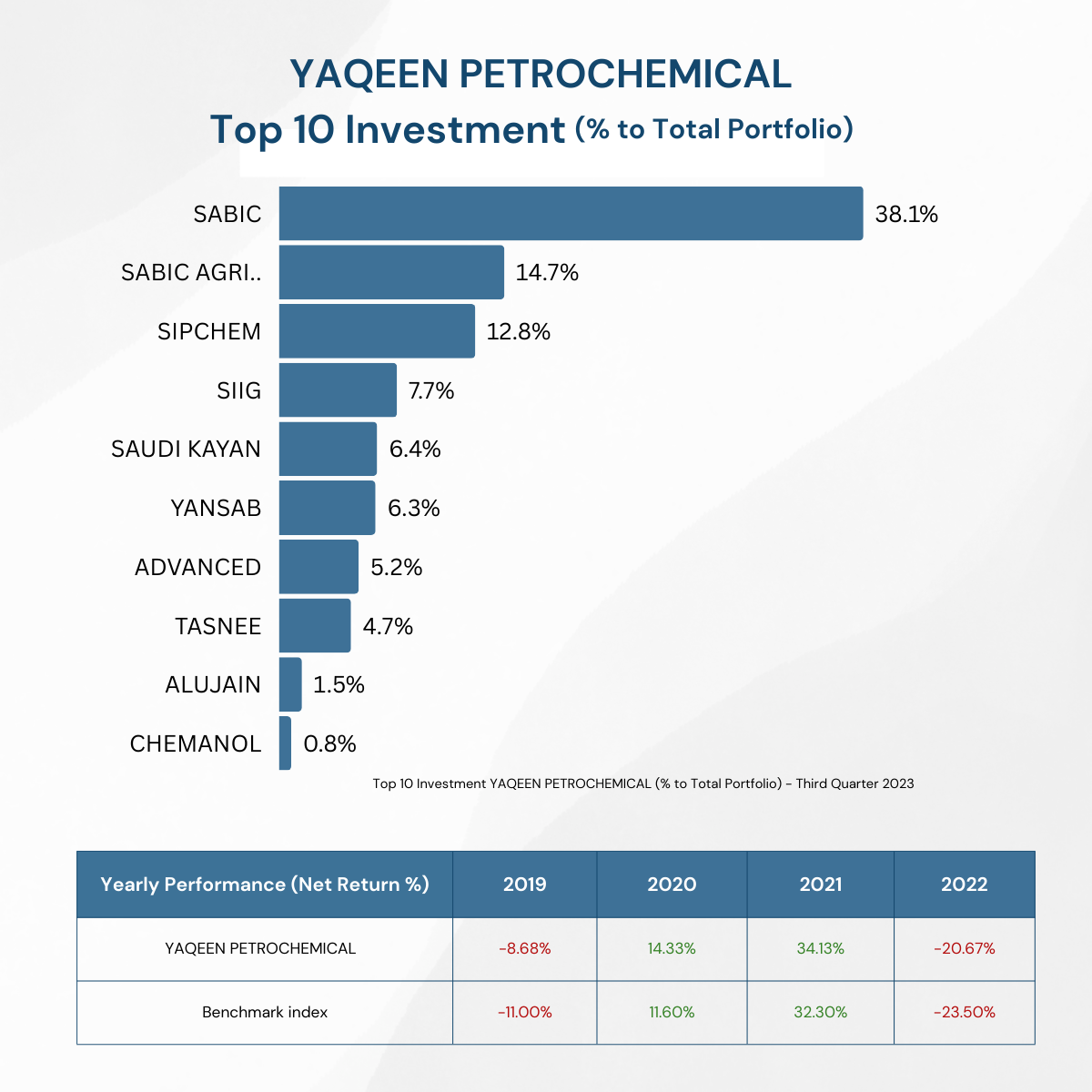
3. SAB MT30 - SAB Invest MSCI Tadawul 30 Saudi ETF (9402):
Unit price: 40.25 SAR (24 Oct 2023)
An open-ended equity fund that was listed in 2011, its objective is to replicate the performance of the MSCI Tadawul 30 Index (benchmark index) which is jointly launched by MSCI and the Saudi Stock Exchange Co. (Tadawul), it reflects the performance of the top largest 30 companies listed on the Saudi Equity Market based on free-float market capitalization.
The fund follows a passive management strategy by investing in the components of the benchmark Index portfolio to replicate the performance of the index. SAB MT30 aims to achieve long-term capital appreciation, the dividends received are retained to be reinvested in the fund. The fund management fees are 0.75% of the net asset value per annum.
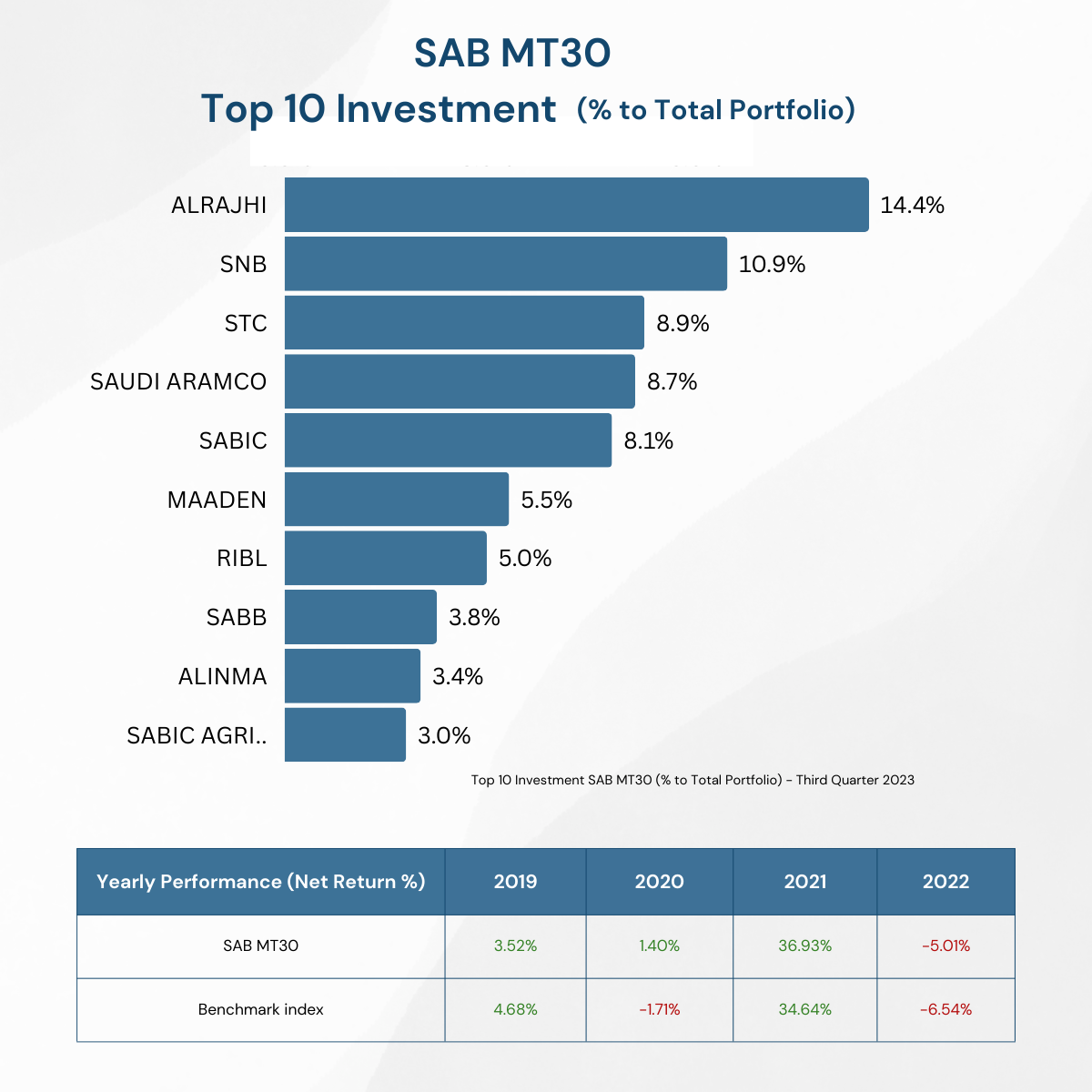
4. ALBILAD SUKUK - Albilad Saudi Sovereign Sukuk ETF (9403):
Unit price: 8.34 SAR (24 Oct 2023)
An open-ended exchange-traded fund that was listed in 2020, seeks to track the performance of Albilad Ideal Ratings Saudi sovereign Sukuk Index (benchmark index), which is made up of Saudi Sovereign Sukuk that is Saudi riyal denominated, in line with the standards of Islamic Sharia, listed in the Saudi Market (Tadawul), and linked to a market maker with remaining 3 months or more in maturity.
The fund follows a passive management strategy by investing in the components of the benchmark Index portfolio to replicate the performance of the index, and it distributes the proceeds received from the Sukuk in the form of monthly dividends. The fund management fees are 0.30% of the net asset value per annum.

5.ALINMA SUKUK - Alinma Saudi Local Government Sukuk ETF Fund- Short-Term (9404):
Unit price: 103.80 SAR (24 Oct 2023)
An open-ended exchange-traded fund that was listed in 2020, aiming to replicate the performance of the iBox Tadawul Short-Term Sovereign Sukuk Index (benchmark index), consisting of Saudi sovereign sukuk denominated in Saudi riyals, and listed on the Saudi Stock Exchange (Tadawul), which has five years or less remaining to maturity. Passive management is used to invest in local sovereign Sukuk issued by the Kingdom’s government by Sharia to achieve performance similar to the performance of the index. It distributes profits semi-annually, and the administrative fees are 0.25% of the net asset value of the fund.

6. ALBILAD GOLD – Albilad Gold ETF (9405)
Unit price: 10.76 SAR (24 Oct 2023)
An open-ended exchange-traded fund listed in 2020, offering investment opportunities in physical gold compatible with Islamic law without the hassle of storing gold bullion, the benchmark index. The spot gold contract price is in effect on the Dubai Gold and Commodities Exchange. It does not distribute cash dividends, but rather reinvests the profits, which is reflected in the unit price. The management fee is 1.50% of the fund's net asset value.

7.ALBILAD MSCI - Albilad MSCI US Equity ETF (9406):
Unit price: 10.24 SAR (24 Oct 2023)
An open-ended exchange-traded fund that was listed in 2022, the benchmark index is “MSCI US Equity Index” and aims to achieve long-term growth and capital gains, investing in the American stock markets allows you to avoid the hassle of opening a portfolio in the American stock market and trading directly in Saudi riyals without the need to convert to the US dollar currency. It is compatible with Islamic law. It does not distribute cash dividends but reinvests the profits, which is reflected in the unit price. The management fee is 0.75% of the fund's net asset value.
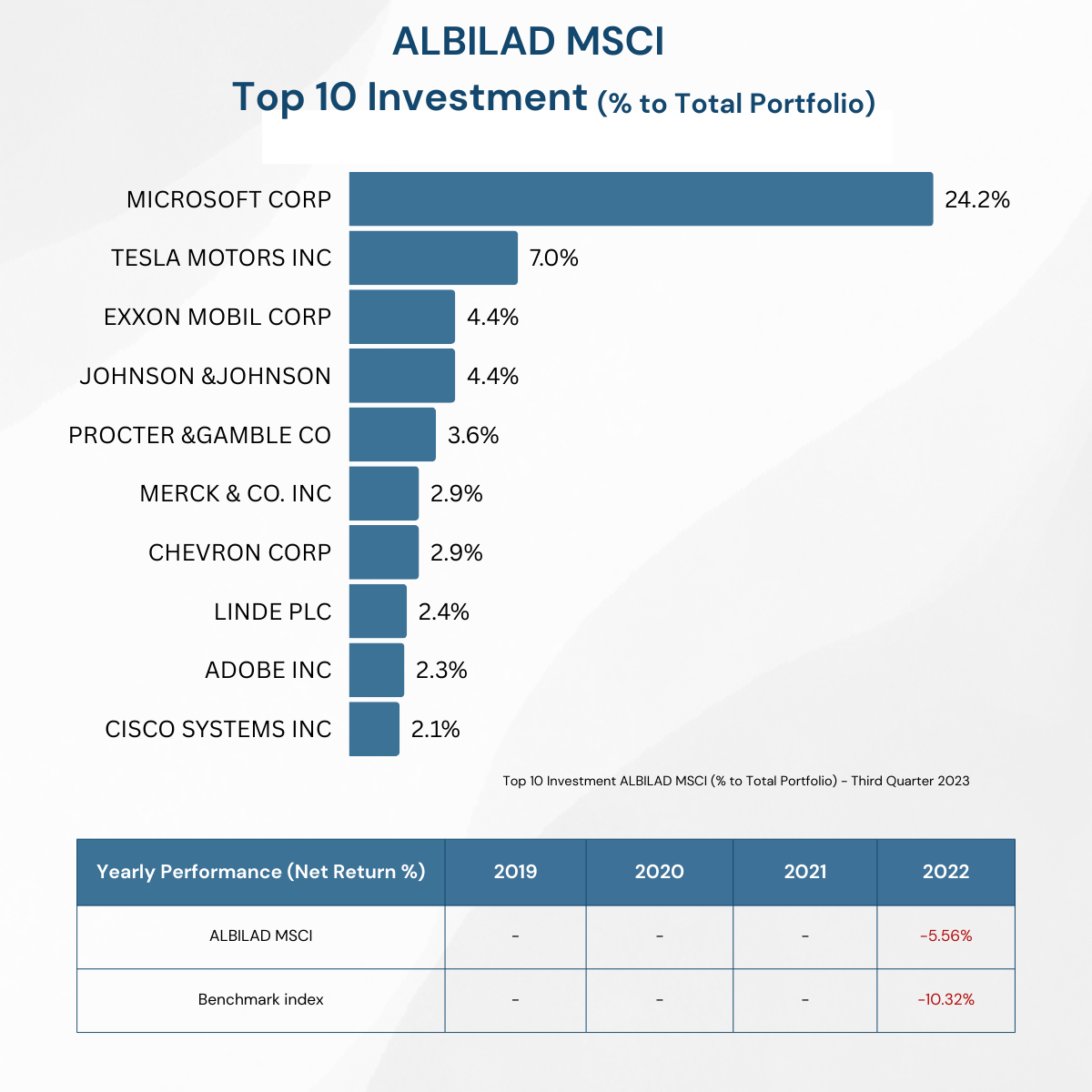
8.ALBILAD US TECH - Albilad MSCI US Tech. ETF (9407):
Unit price: 11.96 SAR (24 Oct 2023)
An open-ended exchange-traded fund that was listed in 2023, the benchmark “MSCI US Technology Equity Index is compatible with... “Sharia standards” and aims to achieve long-term growth and capital gains. It allows investment in American stock markets concentrated in the technology sector without the hassle of opening a portfolio in the American stock market and trading directly in Saudi riyals without the need to convert to the US dollar currency. It is following Islamic law. It does not distribute cash dividends but rather reinvests the profits, which is reflected in the unit price. The management fee is 0.75% of the fund's net asset value.
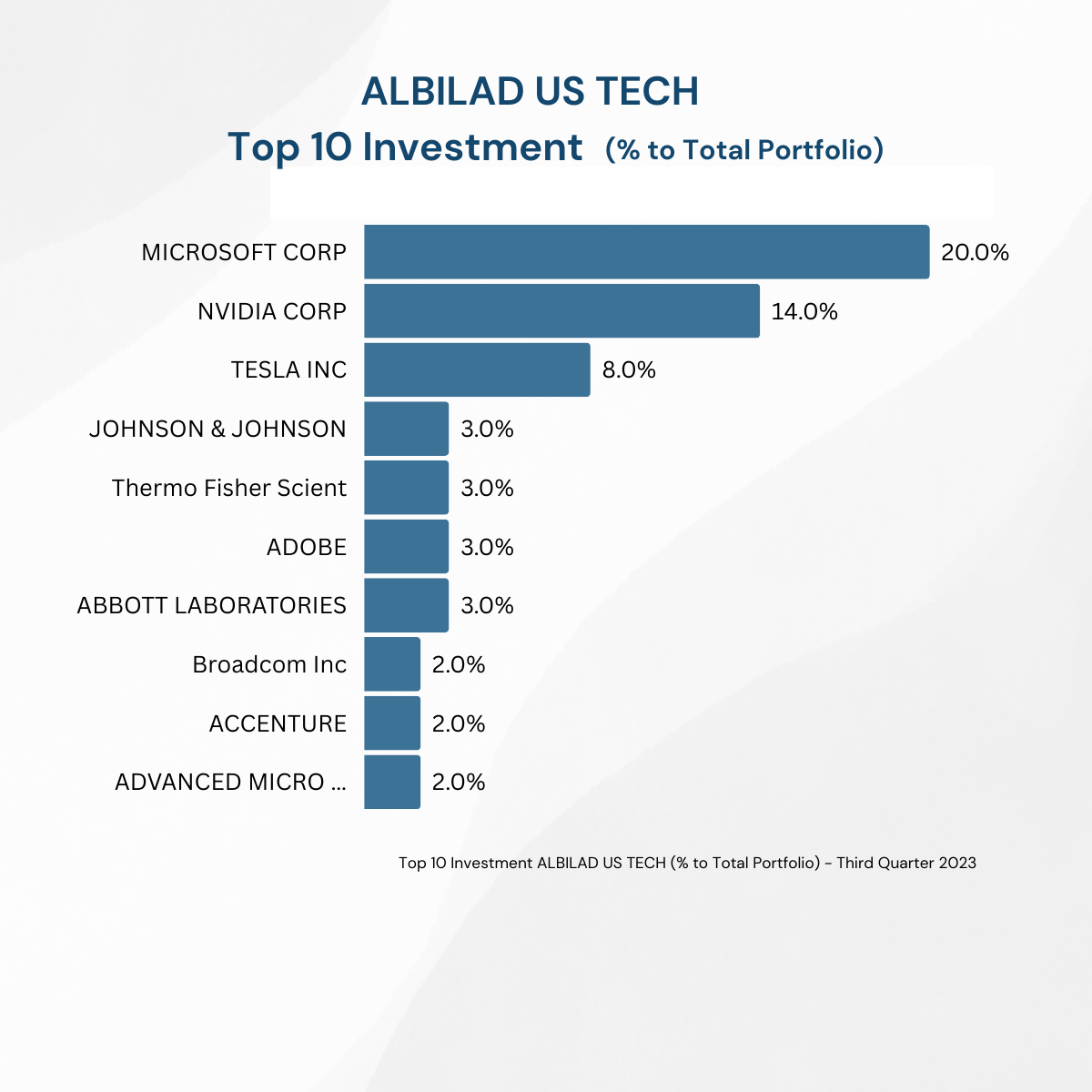
The illustration below compares the annual returns of two ETFs in the Equity and Debt markets:
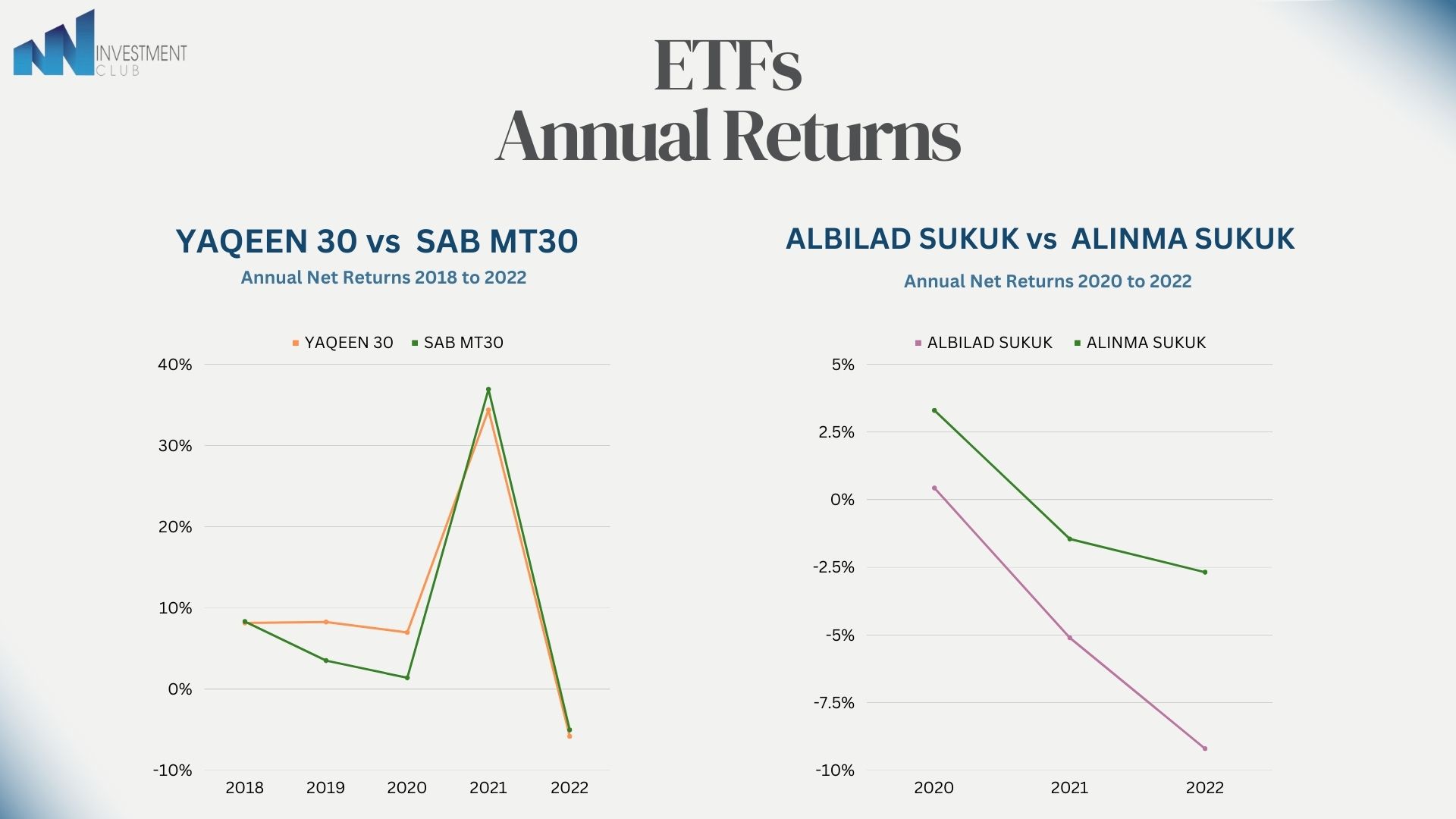
Resources:
- What Are the Different Types of Mutual Funds? (westernsouthern.com)
- صناديق المؤشرات المتداولة – ثمين (thameen.org.sa)
- https://www.saudiexchange.sa
- https://yaqeen.sa/ar/
- https://www.sabinvest.com
- https://www.albilad-capital.com
- https://www.alinmainvestment.com
Prepared by:
- Amani AlDamegh
- Alhanouf Alotaibi
- Dona Alsmari